Unit 1 Lesson 3 Getting to Know You! 课件 2023-2024学年初中英语冀教版八年级上册 (共22张PPT)
文档属性
| 名称 | Unit 1 Lesson 3 Getting to Know You! 课件 2023-2024学年初中英语冀教版八年级上册 (共22张PPT) |
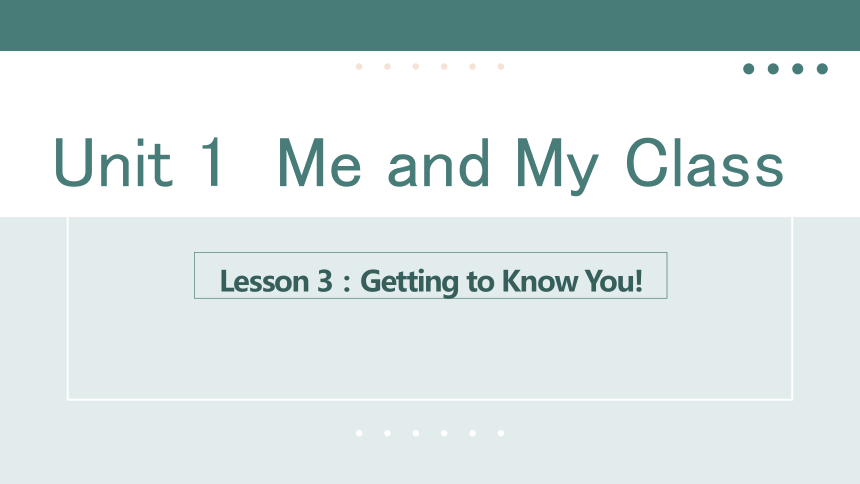
|
|
| 格式 | pptx | ||
| 文件大小 | 649.0KB | ||
| 资源类型 | 教案 | ||
| 版本资源 | 冀教版 | ||
| 科目 | 英语 | ||
| 更新时间 | 2023-11-09 00:00:00 | ||
图片预览

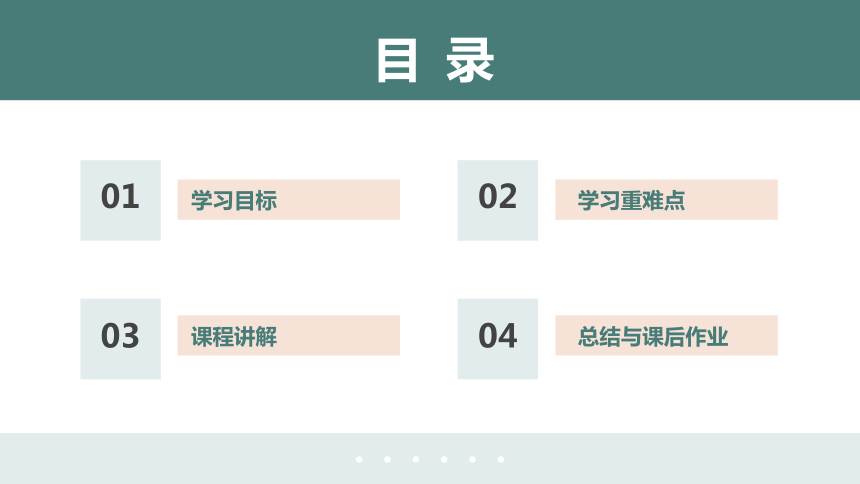
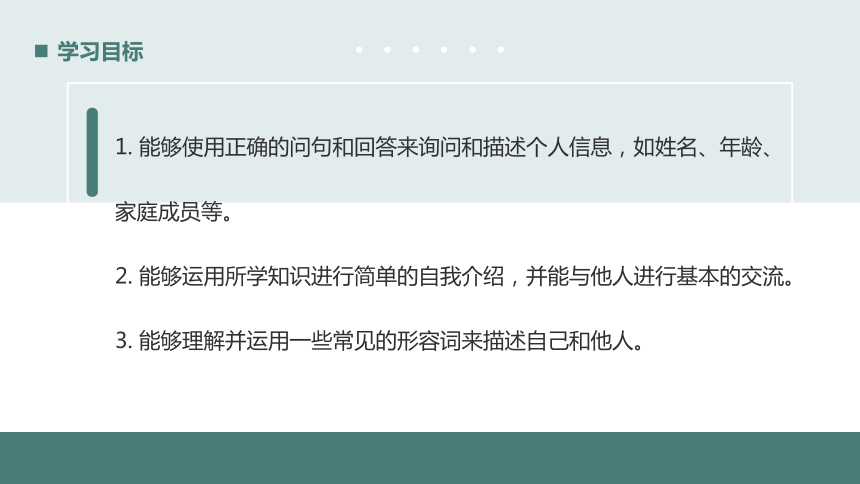

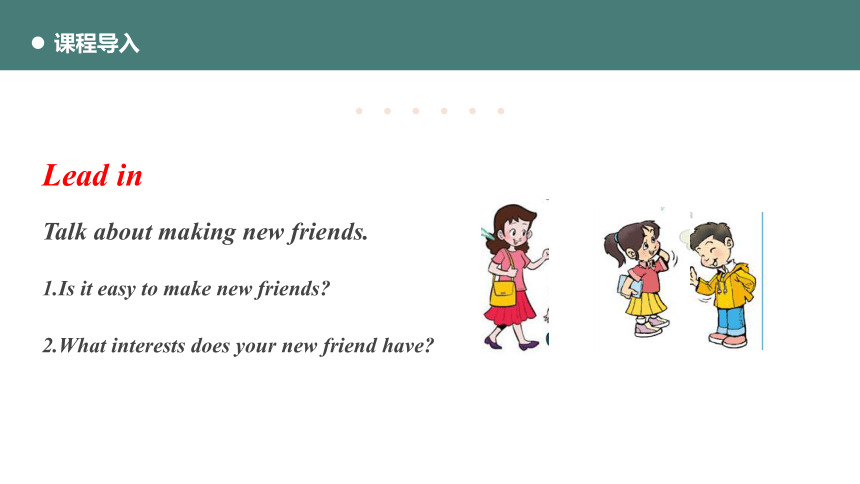
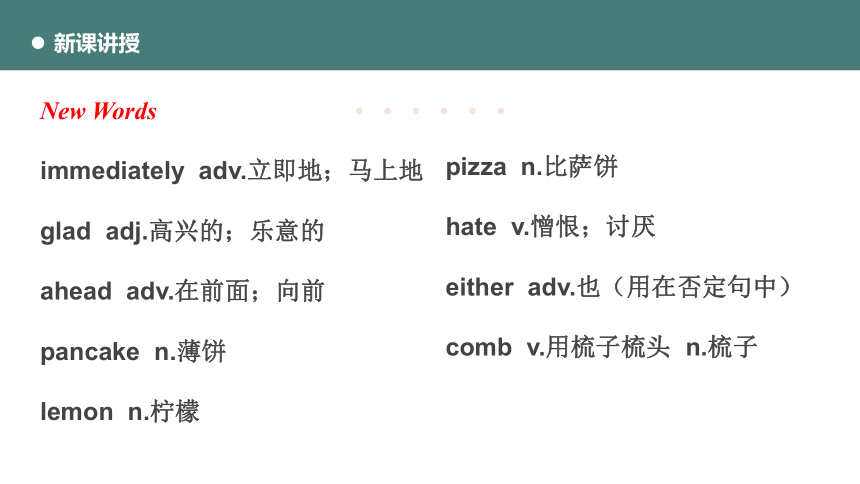
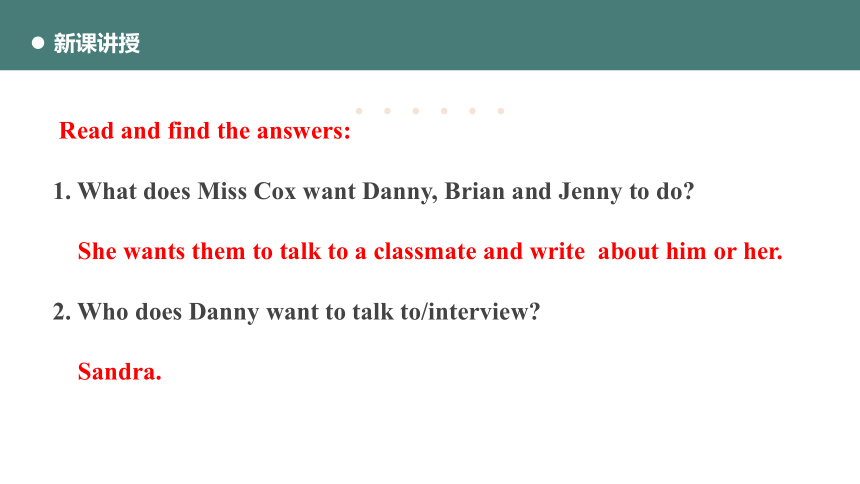

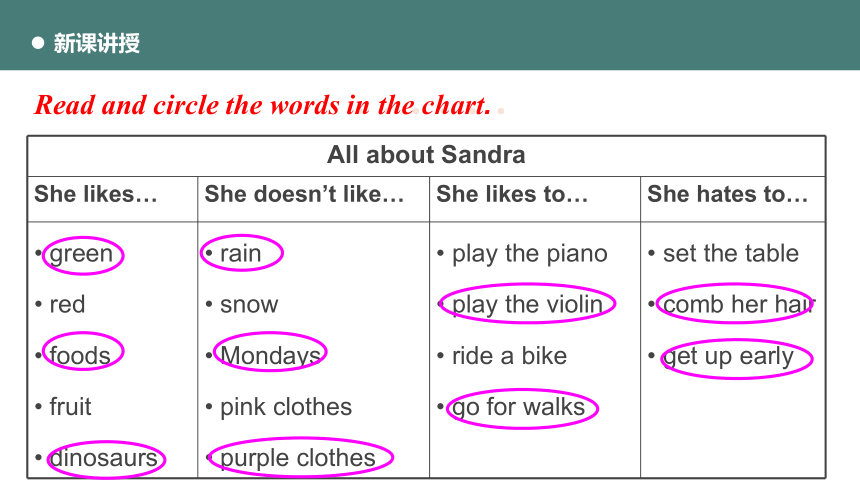
文档简介
(共22张PPT)
Unit 1 Me and My Class
Lesson 3:Getting to Know You!
01
02
03
04
学习目标
学习重难点
课程讲解
总结与课后作业
目 录
1. 能够使用正确的问句和回答来询问和描述个人信息,如姓名、年龄、家庭成员等。
2. 能够运用所学知识进行简单的自我介绍,并能与他人进行基本的交流。
3. 能够理解并运用一些常见的形容词来描述自己和他人。
学习目标
1. 重点:掌握正确的问句和回答方式,能够准确地询问和描述个人信息。
2. 难点:能够灵活运用所学知识进行自我介绍,并能与他人进行基本的交流。
学习重难点
课程导入
Lead in
Talk about making new friends.
1.Is it easy to make new friends
2.What interests does your new friend have
新课讲授
New Words
immediately adv.立即地;马上地
glad adj.高兴的;乐意的
ahead adv.在前面;向前
pancake n.薄饼
lemon n.柠檬
pizza n.比萨饼
hate v.憎恨;讨厌
either adv.也(用在否定句中)
comb v.用梳子梳头 n.梳子
新课讲授
Read and find the answers:
1. What does Miss Cox want Danny, Brian and Jenny to do
She wants them to talk to a classmate and write about him or her.
2. Who does Danny want to talk to/interview
Sandra.
新课讲授
Is it easy to make new friends Why or why not
What interests does your new friend have
新课讲授
Read and circle the words in the chart.
All about Sandra
She likes… She doesn’t like… She likes to… She hates to…
green red foods fruit dinosaurs rain snow Mondays pink clothes purple clothes play the piano play the violin ride a bike go for walks set the table
comb her hair
get up early
词语讲解
1. Let’s see… what’s my first question
加拿大人习惯上用Let’s see来表达Let me see的意思。Let’s see 较为常用。
词语讲解
2. I like donuts best.
like…best 意为“最喜欢……”,
like…better意为“较喜欢……”,
like…very much 意为“很喜欢……”,
like…a little意为 “有点喜欢……”,
don’t (doesn’t) like…at all
意为“根本不喜欢(一点儿也不喜欢)……”。
词语讲解
3. either, too, also 也
either 用于否定句 句尾
too 用于肯定句 句尾
also 用于肯定句 句中 (be动词后 实义动词前)
句法练习
She is a student, _________.
I don’t like rain, _________.
He is _______ in the classroom.
They ________ watch TV in the evening.
too
either
also
also
语法讲授
Glad to meet you, Danny. Sure, go ahead!
很高兴见到你,丹尼。当然可以了,问吧!
go ahead有以下几种常见用法:
— May I start 我可以开始了吗
— Yes, go ahead. 好,开始吧。
— Will you do me a favour 请你帮个忙好吗
— Go ahead. 说吧。
1)表示“同意对方的请求”,根据情况可译为:“说吧,做吧,开始吧,进行吧”。
语法讲授
Go ahead. We’re all listening.
继续讲吧,我们都在听着呢!
Go ahead, what are you waiting for
往前走呀,你在等什么呢
2)表示“请对方继续说或做”等,可译为:“继续……吧”。
语法讲授
You go ahead and tell him that we’re coming.
你先走一步,告诉他我们就来。
You go ahead. I’ll join you soon.
你们先开始,我一会儿就来(和你们一块干)。
3)表示“请对方先走或先做某事”, 可译为:“你先走一步,你先请”。
课后练习
单项选择
1. I have ______ to show my parents.
A. something different B. different something C. anything different
D. different anything
2. My parents want me ______ to college.
A. go B. to go C. going D. went
课后练习
3.If you don’t want to go swimming, I won’t, ______.
A. too B. also C. either D. neither
4. Tina, could you please play ______ piano for me while I’m singing
A. a B. an C. the D. 不填
归纳总结
go ahead
write down
go for walks
What colour do you like
What do you hate
向前,先走
写下,记下
散步
你喜欢什么颜色
你讨厌什么?
课后作业
Homework
Write a passage about what your new friend likes and hates to do.
名言警句
Everything is good when new, but friends when old.
东西是新的好,朋友是老的亲。
下节课再见!
Unit 1 Me and My Class
Lesson 3:Getting to Know You!
01
02
03
04
学习目标
学习重难点
课程讲解
总结与课后作业
目 录
1. 能够使用正确的问句和回答来询问和描述个人信息,如姓名、年龄、家庭成员等。
2. 能够运用所学知识进行简单的自我介绍,并能与他人进行基本的交流。
3. 能够理解并运用一些常见的形容词来描述自己和他人。
学习目标
1. 重点:掌握正确的问句和回答方式,能够准确地询问和描述个人信息。
2. 难点:能够灵活运用所学知识进行自我介绍,并能与他人进行基本的交流。
学习重难点
课程导入
Lead in
Talk about making new friends.
1.Is it easy to make new friends
2.What interests does your new friend have
新课讲授
New Words
immediately adv.立即地;马上地
glad adj.高兴的;乐意的
ahead adv.在前面;向前
pancake n.薄饼
lemon n.柠檬
pizza n.比萨饼
hate v.憎恨;讨厌
either adv.也(用在否定句中)
comb v.用梳子梳头 n.梳子
新课讲授
Read and find the answers:
1. What does Miss Cox want Danny, Brian and Jenny to do
She wants them to talk to a classmate and write about him or her.
2. Who does Danny want to talk to/interview
Sandra.
新课讲授
Is it easy to make new friends Why or why not
What interests does your new friend have
新课讲授
Read and circle the words in the chart.
All about Sandra
She likes… She doesn’t like… She likes to… She hates to…
green red foods fruit dinosaurs rain snow Mondays pink clothes purple clothes play the piano play the violin ride a bike go for walks set the table
comb her hair
get up early
词语讲解
1. Let’s see… what’s my first question
加拿大人习惯上用Let’s see来表达Let me see的意思。Let’s see 较为常用。
词语讲解
2. I like donuts best.
like…best 意为“最喜欢……”,
like…better意为“较喜欢……”,
like…very much 意为“很喜欢……”,
like…a little意为 “有点喜欢……”,
don’t (doesn’t) like…at all
意为“根本不喜欢(一点儿也不喜欢)……”。
词语讲解
3. either, too, also 也
either 用于否定句 句尾
too 用于肯定句 句尾
also 用于肯定句 句中 (be动词后 实义动词前)
句法练习
She is a student, _________.
I don’t like rain, _________.
He is _______ in the classroom.
They ________ watch TV in the evening.
too
either
also
also
语法讲授
Glad to meet you, Danny. Sure, go ahead!
很高兴见到你,丹尼。当然可以了,问吧!
go ahead有以下几种常见用法:
— May I start 我可以开始了吗
— Yes, go ahead. 好,开始吧。
— Will you do me a favour 请你帮个忙好吗
— Go ahead. 说吧。
1)表示“同意对方的请求”,根据情况可译为:“说吧,做吧,开始吧,进行吧”。
语法讲授
Go ahead. We’re all listening.
继续讲吧,我们都在听着呢!
Go ahead, what are you waiting for
往前走呀,你在等什么呢
2)表示“请对方继续说或做”等,可译为:“继续……吧”。
语法讲授
You go ahead and tell him that we’re coming.
你先走一步,告诉他我们就来。
You go ahead. I’ll join you soon.
你们先开始,我一会儿就来(和你们一块干)。
3)表示“请对方先走或先做某事”, 可译为:“你先走一步,你先请”。
课后练习
单项选择
1. I have ______ to show my parents.
A. something different B. different something C. anything different
D. different anything
2. My parents want me ______ to college.
A. go B. to go C. going D. went
课后练习
3.If you don’t want to go swimming, I won’t, ______.
A. too B. also C. either D. neither
4. Tina, could you please play ______ piano for me while I’m singing
A. a B. an C. the D. 不填
归纳总结
go ahead
write down
go for walks
What colour do you like
What do you hate
向前,先走
写下,记下
散步
你喜欢什么颜色
你讨厌什么?
课后作业
Homework
Write a passage about what your new friend likes and hates to do.
名言警句
Everything is good when new, but friends when old.
东西是新的好,朋友是老的亲。
下节课再见!
同课章节目录
- Unit 1 Me and My Class
- Lesson 1 Back to School!
- Lesson 2 Many Faces, One Picture
- Lesson 3 Getting to Know You!
- Lesson 4 Best Friends
- Lesson 5 Meet Ms. Liu
- Lesson 6 Jenny's Week
- Unit 2 My Favourite School Subject
- Lesson 7 Don't Be Late for Class!
- Lesson 8 E-mail Helpers!
- Lesson 9 I Don't Want to Miss Geography !
- Lesson 10 Looking for Lisa
- Lesson 11 Lily Learns about China !
- Lesson 12 Karen's Hair Stood Up!
- Unit Review
- Unit 3 Families Celebrate Togethe
- Lesson 13 I Love Autumn
- Lesson 14 Happy Memories
- Lesson 15 A Present for Li Ming!
- Lesson 16 Happy Thanksgiving!
- Lesson 17 Presents from Canada!
- Lesson 18 Li Ming's Birthday
- Unit Review
- Unit 4 My Neighbourhood
- Lesson 19 The Best Neighourhood
- Lesson 20 No Stopping!
- Lesson 21 Eat a Donut and Turn Right
- Lesson 22 I Like My Neighbourhood
- Lesson 23 People in My Neighbourhood
- Lesson 24 I Need a Map!
- Unit Review
- Unit 5 My Future
- Lesson 25 I Want to Be a Teacher!
- Lesson 26 What Will I Be ?
- Lesson 27 What's Your Advice?
- Lesson 28 Rich or Poor? It Doesn't Matter!
- Lesson 29 Our Ambitions and Dreams
- Lesson 30 A Famous Friend?
- Unit Review
- Unit 6 Go With Transportation !
- Lesson 31 How Do You Travel ?
- Lesson 32 Trains Go Faster !
- Lesson 33 Life on Wheels
- Lesson 34 Flying Donuts
- Lesson 35 Future Transportation
- Lesson 36 Clean Cars ?
- Unit Review
- Unit 7 Enjoy Your Hobby
- Lesson 37 What's Your Hobby ?
- Lesson 38 Hobbies Are Fun!
- Lesson 39 Danny's Hobby
- Lesson 40 What's Paul's Hobby?
- Lesson 41 Show and Tell!
- Lesson 42 The New Club
- Unit Review
- Unit 8 Celebrating Me
- Lesson 43 What Makes You Unique?
- Lesson 44 Georgia Plays Basketball
- Lesson 45 Be Yourself !
- Lesson 46 My Dream
- Lesson 47 I Made It !
- Lesson 48 Li Ming's Report
- Unit Review
